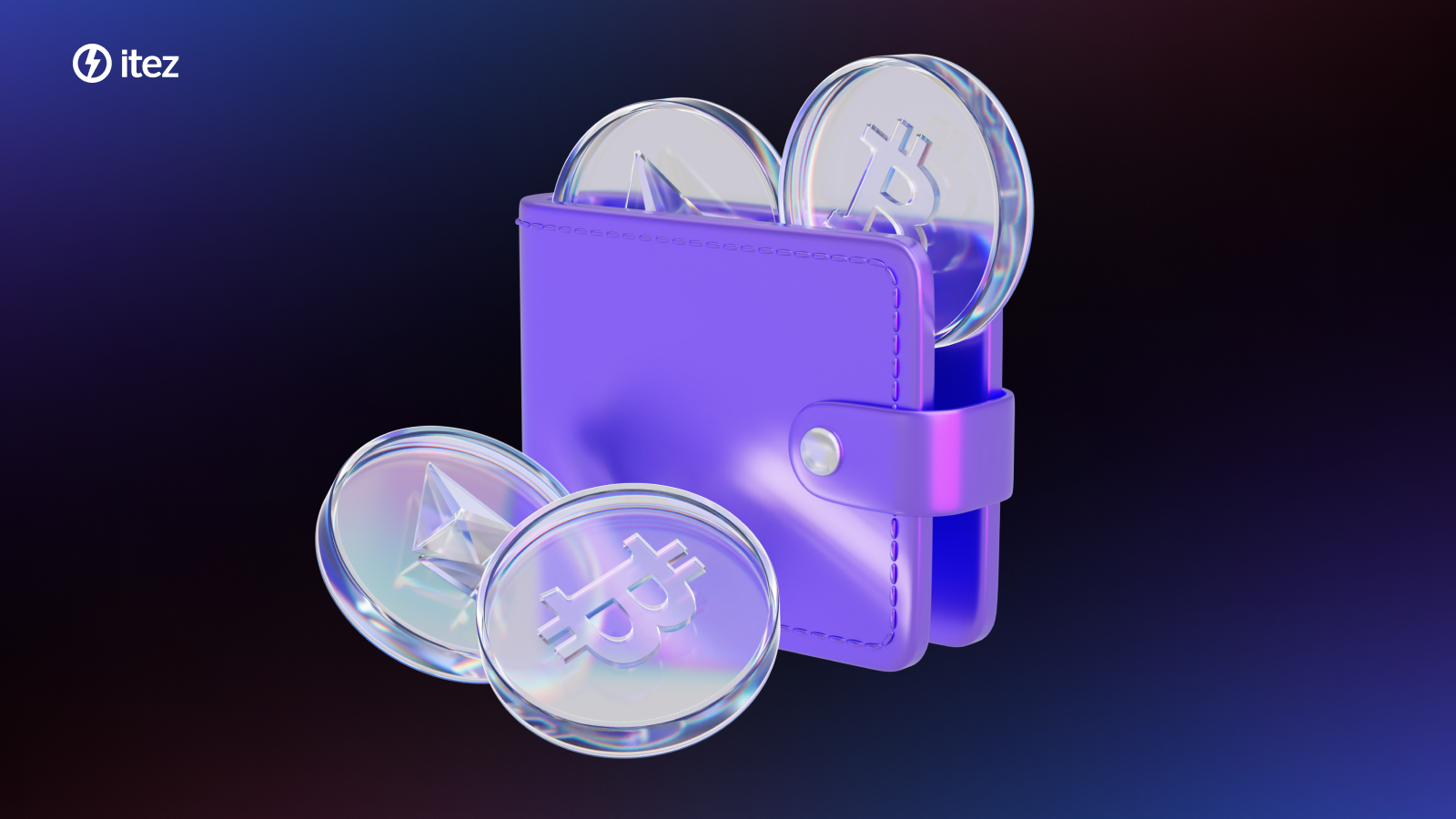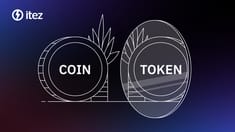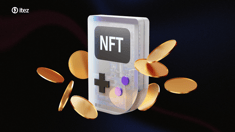
Anyone venturing from theory to practice in the world of cryptocurrencies inevitably faces the question: “What is a cryptocurrency wallet?”
To help newcomers feel comfortable and confident, the itez team has put together this comprehensive guide. Read on to learn what digital wallets are, the different types available, how to choose the right wallet, and how to ensure its security.
How does a cryptocurrency wallet work?
To begin with, let's clarify some definitions. A cryptocurrency wallet, or digital wallet, is the sole option for cryptocurrency storage. This wallet can exist as a programme, a web extension, or even a physical device.
Interestingly, a crypto wallet doesn't store the cryptocurrency that exists in the blockchain, a distributed ledger. Instead, the wallet stores cryptographic keys that effectively give the user access to the crypto coins and tokens that remain “living” within the blockchain.
Here's how a cryptocurrency wallet works:
1. Creating a wallet. The first step is to choose a wallet model that suits your needs and create a new address. We'll discuss how to do this later. At this stage, it's crucial to ensure the security of the new wallet, including the creation of a private key.
2. Receiving cryptocurrency. Once set up, the user can start conducting cryptocurrency transactions. One of the first actions is to receive coins as the wallet is empty.
3. Storing cryptocurrency. The primary function of a digital wallet is to store coins and tokens. As mentioned earlier, the cryptocurrency assets are stored in the blockchain. The wallet merely holds the private keys, which give users access to their cryptocurrency accounts.
4. Sending cryptocurrency. The cryptocurrency bought or stored in the wallet can also be sent to others. To do this, you need to specify the recipient's cryptocurrency address and the amount of coins you want to send. The transaction will then be recorded on the blockchain.
Types of cryptocurrency wallets
Now, let’s explore the different types of cryptocurrency wallets. Don’t skip this part, because understanding the unique characteristics and nuances of each type will help you determine which wallet is best suited for your needs.
Hot wallets
Let’s start with the most popular and accessible option. A hot wallet is specialised software that is installed on a user’s device, whether that be a computer or a mobile device.
These wallets are constantly connected to the internet as they store cryptocurrency assets online. This is why they are also known as online wallets.
Some of the most popular hot wallets include MetaMask and Trust Wallet.
Trust Wallet interface. Source: TrustWallet
Pros:
Ease of use. Hot wallets are very easy to set up and use, which makes them ideal for beginners.
Simplified access. Hot wallets allow users to always have access to their funds, often from any device.
Functionality. Online wallets are compatible with any platform that works with cryptocurrency. They can also gain new features—many exchanges, for instance, allow staking directly through a hot wallet.
Cons:
Security. Unfortunately, hot wallets are much more vulnerable to hacking and viruses because they are constantly connected to the internet.
You can find a comprehensive review of hot wallets in our article.
Cold Wallets
Let’s now see the complete opposite of hot wallets—cold wallets. These wallets are typically a small physical device.
Cold wallets store private keys offline as they don’t require constant internet access for its operation. Internet connection is only needed when the owner wants to transfer their coins.
Some of the most prominent examples of cold wallets include KeepKey and Ledger.
Ledger Shop website
Pros:
Network security. Cold storage wallets are virtually impervious to online threats, which makes them ideal for long-term storage of large sums.
Physical security. If users protect their devices from both online and physical threats, cold wallets can serve them perfectly for many years.
Cons:
High cost. The price of cold wallets often starts at several tens of dollars and can go up to hundreds.
Complexity of use. Cold wallets are not as user-friendly as hot wallets, so they are not recommended for beginners.
Want to learn even more about cold wallets? Be sure to read our special review on these models!
Decentralised wallets
Now, let's delve into another equally fascinating group of cryptocurrency wallets. The key question here is where the users' private keys are stored.
Decentralised cryptocurrency wallets do not store cryptocurrency assets or users' private keys on servers. Instead, the responsibility for the security of their funds lies with users.
There are many models of such wallets on the market, with MetaMask and Trust Wallet being among the most popular.
MetaMask Wallet interface. Source: MetaMask
Pros:
Complete control. Decentralised wallets are ideal for users who don't trust third parties and want to manage their funds themselves.
High level of security. Since private keys are stored either offline or in encrypted form on the user's device, the risk of online threats is significantly lower.
Cons:
High responsibility. If a user loses their private keys or forgets them, there is no one to help recover them. In such cases, regaining access to funds can be extremely difficult.
Complexity of use. The process of creating, setting up, and using decentralised wallets can be too complicated for inexperienced market participants.
Centralised wallets
With centralised wallets for cryptocurrency assets, the situation is the opposite.
These wallets are services managed by third-party companies. Representatives of these third parties, often centralised cryptocurrency exchanges, store users' private keys and cryptocurrencies on their servers.
The list of centralised wallets is almost endless, but some of the most well-known include the crypto wallets from popular exchanges like Coinbase and Binance.
Coinbase Wallet interface. Source: Coinbase
Pros:
Ease of use. Centralised wallets are generally very simple and user-friendly, which makes them an excellent choice for beginners.
Support. If anything happens to a user's private keys or funds, the cryptocurrency exchange can provide cryptocurrency support and help restore access to the account.
Cons:
Hacker threats. Unfortunately, centralised exchanges are often prime targets for hackers. In the event of a hack, users may lose access to their funds for an extended period or even permanently.
Internal risks. By choosing a centralised wallet, users agree to store their digital assets on the exchange's servers. If a technical failure occurs or someone from the exchange's team engages in fraudulent activity, the user's funds could be at risk.
How to choose a cryptocurrency wallet?
The next important question is how to choose that one wallet that will be the perfect solution for the user's needs?
Whether members of the crypto community are eyeing a Bitcoin wallet, Ethereum wallet, or any other, they'll need to start by answering a few important questions:
1. How much cryptocurrency do I plan to store?
2. How often do I intend to make transactions?
3. What level of security do I expect?
4. How important is ease of use to me?
5. What is my budget for purchasing a wallet?
NB! Some wallets charge transaction fees for conducting operations. Before starting to use a particular wallet, users are better off checking whether it charges fees in advance.
The most important thing here is that there is no one-size-fits-all solution. Choosing the right cryptocurrency wallet depends on the individual needs and requirements, budget, and experience in the digital asset market.
And there's no need to limit oneself to just one wallet. Experienced crypto users often use several different wallets at the same time, switching between them depending on the task. For example, they might use a hot wallet for everyday transactions, keep the majority of their funds on a cold wallet, choose a decentralised wallet for operations where anonymity and confidentiality are important, and stake their crypto on a centralised wallet.
Security of cryptocurrency wallet
By now you would’ve chosen a cryptocurrency wallet (or even two). So, then we’re coming to managing cryptocurrency. Here, we'll talk about how to ensure maximum security for our cryptocurrency storage. Several key risk management techniques will help us.
1. A seed phrase is a unique sequence of 12 to 24 words in English. With it, the user can regain access to their wallet and the funds stored in it if something goes wrong.
Therefore, the seed phrase should be treated very responsibly: store it in a secure place (preferably in multiple copies in several different places) and do not disclose it to other people.
2. Private keys are the most important part of the security system of any type of wallet. They are generated automatically when users create a cryptocurrency wallet. These keys grant access to the funds stored in the wallet.
Ideally, private keys should be known only to the owner of the wallet. It's best to store them in a secure place and in offline mode to prevent hackers from stealing them.
3. A password is a secret combination of numbers, letters, or other characters. Just like on a computer or a phone.
The more complex the password, the better for the wallet owner and the worse for the wrongdoers. It's also a good idea not only to set complex passwords but also not to use the same password for multiple devices. Additionally, it's advisable to regularly change passwords for your wallet.
4. Two-factor authentication, or 2FA, is also familiar to most of our readers. The essence of this method is to use two forms of identity verification when requesting access to the wallet. For example, this could be a password and an SMS code, or a private key plus biometric data.
The more verification checks, the harder it will be to gain unauthorised access. Therefore, it might be a good idea to use 2FA for all wallets and accounts on exchanges.
Conclusion: cryptocurrency wallet—your key to cryptocurrency
In the world of cryptocurrency wallets, it's easy to get lost, but we hope that this comprehensive guide has helped you learn more about ways to store cryptocurrency and find the tool that suits you best.
And to not miss even more interesting and useful articles, don't forget to read our blog!
🤔 So, what crypto wallet would you choose? Share your views in our socials!
💌 Telegram, Twitter, Instagram, Facebook
Here are three other cool articles:
Telegram cryptocurrency wallet: how it works
Binance Web3 Wallet: exploring features and drawbacks
This article is not investment advice or a recommendation to purchase any specific product or service. The financial transactions mentioned in the article are not a guide to action. It’s not intended to constitute a comprehensive statement of all possible risks. You should independently conduct an analysis on the basis of which it will be possible to draw conclusions and make decisions about making any operations with cryptocurrency.








